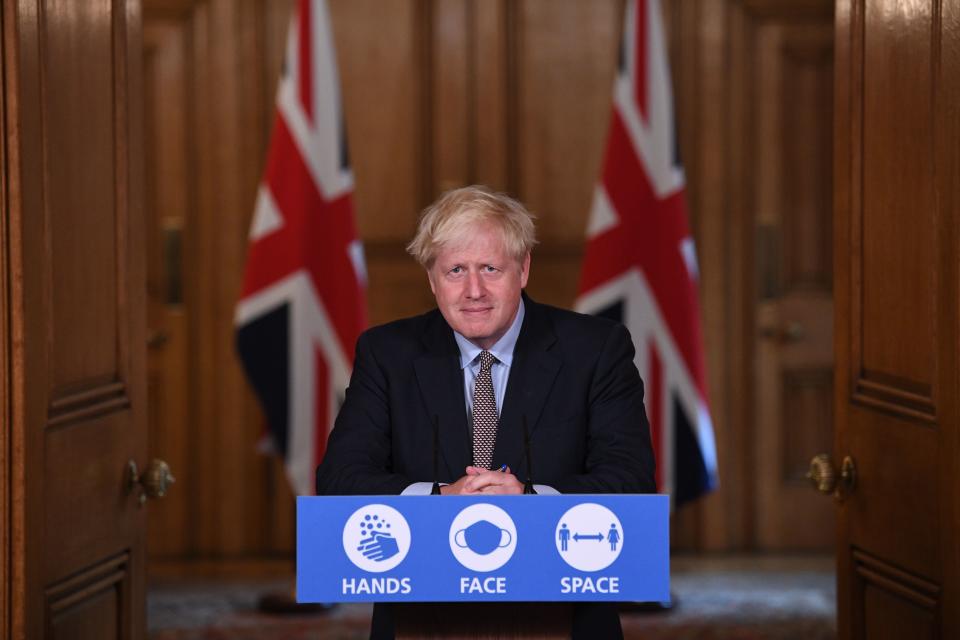New COVID laws make it illegal to pretend you’ve been in contact with someone
Watch: What are the fines for breaching self-isolation? Find out here:
England’s new coronavirus laws make it illegal for a person who tested positive for COVID-19 to pretend they were in contact with someone they weren’t.
The Health Protection (Coronavirus, Restrictions) (Self-Isolation) (England) Regulations 2020, which came into force on Monday, say a person commits an offence if they knowingly give false information on the issue.
This means that if a person says they have been in contact with someone and could have infected them with coronavirus, but weren’t actually in contact with them, they will receive a £4,000 fine for a first offence, or £10,000 for second or subsequent offence.
Refusal to pay the fine will result in a court summons.

The regulations also say a person who "recklessly" breaks self-isolation rules and has reason to believe they will come into close contact with another person or group without a reasonable excuse commits an offence.
If this rule is broken, the person could be fined £1,000 for a first offence, a figure that rises if repeated.

Backbench Tory MPs have raised concerns about the government’s use of emergency coronavirus laws to bypass Parliament, and dozens have signalled they could revolt on the matter.
Read more: Pubs, restaurants and cafés ‘contributed to a fifth of COVID-19 infections’
Boris Johnson must win a vote in the House of Commons to preserve the Coronavirus Act, which was brought in on 23 March but must be renewed every six months to stay in effect.
Conservative have rebels seized upon an assessment by academics at University College London (UCL) that concluded that “Parliament has been consistently sidelined during the pandemic”.
Watch: Steve Baker calls MPs to have greater say on COVID-19 measures
More than 50 Conservative MPs have signed up to an amendment tabled by Sir Graham Brady, chairman of the party’s influential backbench 1922 Committee, calling for ministers to consult Parliament before introducing new curbs on people’s freedoms.
The size of the rebellion could see the government facing defeat if the amendment is selected for a vote and opposition parties join forces with Sir Graham.
Former minister Steve Baker, one of those signed up to the amendment, told the PA news agency he believed the government will be forced to back down.
Read more: Third wave of coronavirus 'entirely possible', government adviser warns
“I have always hoped we would find a way through to prior parliamentary approval,” he said.
“I’m more optimistic now the UCL Constitution Unit has said we are right.”
Baker likened some of the government’s coronavirus restrictions to rules seen in George Orwell’s dystopian novel 1984, specifically referencing a ban on singing and dancing in bars, cafes and restaurants.
The blog post by UCL’s Professor Meg Russell and Lisa James said: “MPs have genuine cause for complaint.
Read more: Third wave of coronavirus 'entirely possible', government adviser warns
“Only yesterday regulations on self-isolation were published, coming into effect just seven hours later, and imposing potential £10,000 fines; yet, despite media briefings eight days previously, these were not debated in Parliament.
“Such cases raise clear political questions, but also legal ones: as the underlying legislation allows ministers to bypass Parliament only if a measure is so urgent that there is no time for debate.”

They added that decisions to sideline Parliament were part of a “longer-running trend” under Johnson.
“In his first six months as Prime Minister, Johnson cancelled or indefinitely postponed three Liaison Committee evidence sessions, unlawfully prorogued Parliament, and introduced a Withdrawal Agreement Act which – unlike its predecessor – gave Parliament no real oversight of this year’s Brexit negotiations,” they said.
Human rights groups are also lobbying MPs to scrap the legislation.
Groups like Liberty and Black Lives Matter UK say the legislation disproportionally affects ethnic minorities and vulnerable people.

Liberty director Martha Spurrier wrote in a joint statement with other groups: “MPs had barely any time to scrutinise the Coronavirus Act when it was introduced.
“They’ve had six months to watch the failure of using a criminal justice response to a public health crisis and the cruelty of how the Act abandons the most marginalised when their rights need to be upheld.
“The Act epitomises the Government’s determination to prioritise criminal justice over public health, and its disregard for our rights. Renewing the Act now would consolidate this power grab, putting our rights at even greater risk in the long term.
“It is time for Parliament to repeal the Coronavirus Act and create a strategy that protects our rights, as well as our health.”
Coronavirus: what happened today
Click here to sign up to the latest news and information with our daily Catch-up newsletter

 Yahoo Finance
Yahoo Finance 
